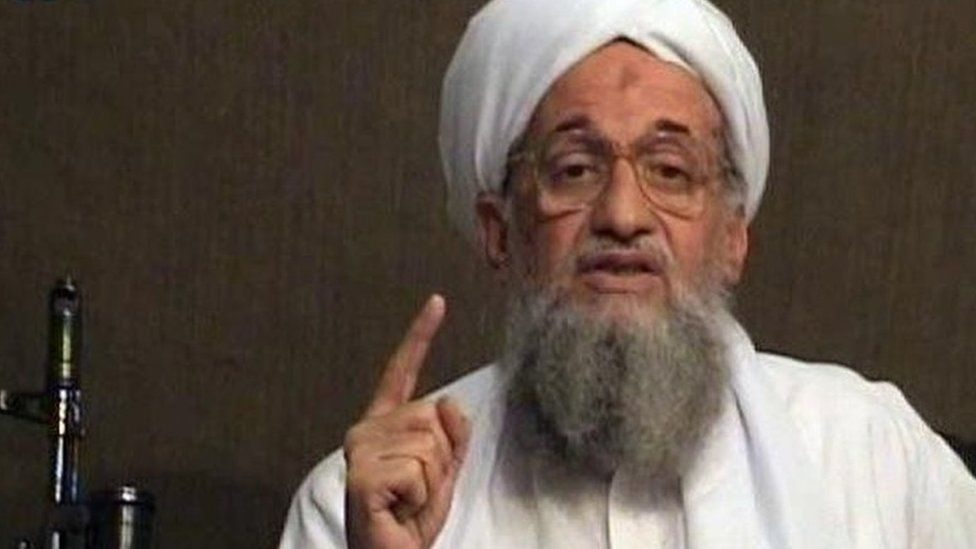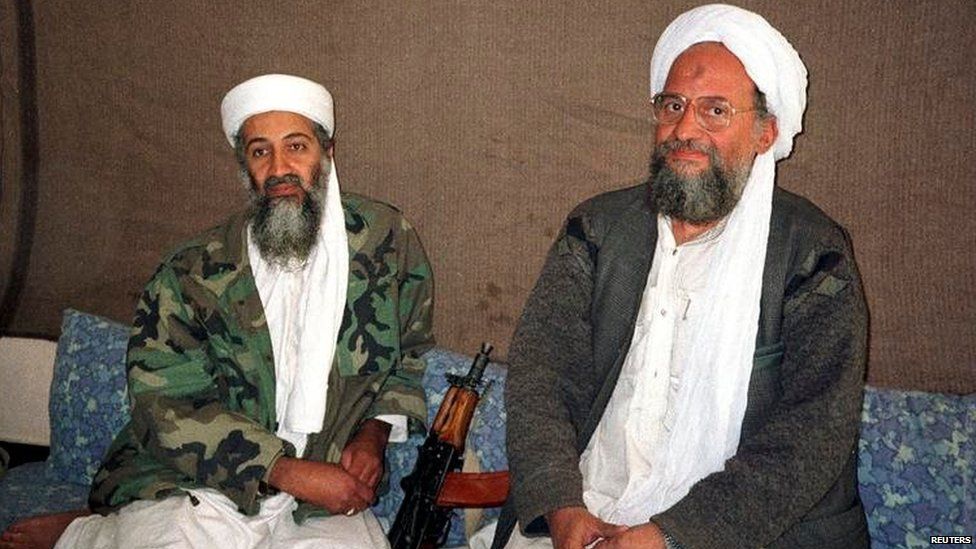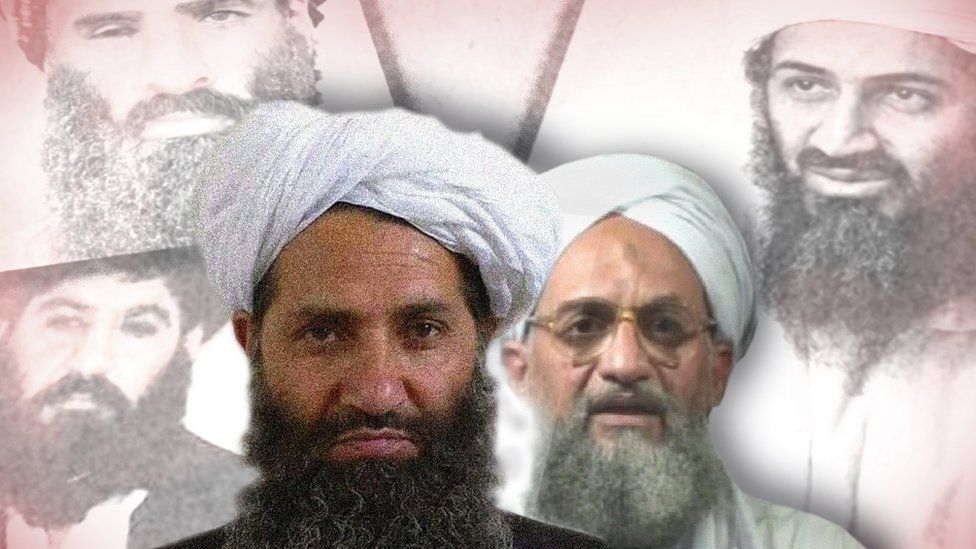- Joined
- Feb 26, 2019
- Messages
- 12,449
- Points
- 113
bbc.com
BBC News
 Image source, AFP
Image source, AFP
Image caption,
Zawahiri took over the leadership of al-Qaeda following the killing of Osama Bin Laden in May 2011
The US has killed the leader of al-Qaeda, Ayman al-Zawahiri, in a drone strike in Afghanistan, President Joe Biden has confirmed.
He was killed in a counter-terrorism operation carried out by the CIA in the Afghan capital of Kabul on Sunday.
Mr Biden said Zawahiri had "carved a trail of murder and violence against American citizens".
"Now justice has been delivered and this terrorist leader is no more," he added.
Officials said Zawahiri was on the balcony of a safe house when the drone fired two missiles at him.
Other family members were present, but they were unharmed and only Zawahiri was killed, they added.
Mr Biden said he had given the final approval for the "precision strike" on the 71-year-old al-Qaeda leader after months of planning.
Zawahiri took over al-Qaeda after the death of Osama bin Laden in 2011. He and Bin Laden plotted the 9/11 attacks together and he was one of the US's "most wanted terrorists".
His killing will bring closure to families of the victims of the 2001 attacks, Mr Biden said.
"No matter how long it takes, no matter where you hide, if you are a threat to our people, the United States will find you and take you out," said Mr Biden, adding that "we shall never waver from defending our nation and its people".
Mr Biden said Zawahiri had also masterminded other acts of violence, including the suicide bombing of the USS Cole naval destroyer in Aden in October 2000 which killed 17 US sailors.
Media caption,
Biden on Zawahiri killing: 'Justice has been delivered'
A Taliban spokesman described the US operation as a clear violation of international principles.
"Such actions are a repetition of the failed experiences of the past 20 years and are against the interests of the United States of America, Afghanistan and the region," the spokesman added.
However, US officials maintained that the operation had a legal basis.
 Ayman al-Zawahiri was the ideological brains behind al-Qaeda.
Ayman al-Zawahiri was the ideological brains behind al-Qaeda.
An Egyptian doctor who was imprisoned in the 1980s for involvement in militant Islam, he left the country after his release and became involved in violent international jihadist movements.
Eventually he settled in Afghanistan and joined forces with a rich Saudi, Osama Bin Laden. Together they declared war on the US and organised the 11 September 2001 attacks.
It took a decade for Bin Laden to be tracked down and killed by the US. After that, Zawahiri assumed leadership of al-Qaeda, but he became a remote and marginal figure, only occasionally issuing messages.
The US will herald his death as a victory, particularly after the chaotic withdrawal from Afghanistan last year, but Zawahiri held relatively little sway as new groups and movements such as Islamic State have become increasingly influential. A new al-Qaeda leader will no doubt emerge, but he will likely have even less influence than his predecessor.
The killing of Zawahiri comes nearly a year after US troops completed their withdrawal from Afghanistan on the orders of Mr Biden, bringing an end to a 20-year military presence there.
Under a 2020 peace deal with the US, the Taliban agreed not to allow al-Qaeda or any other extremist group to operate in areas under their control.
However, the Taliban and al-Qaeda are long-time allies and US officials said the Taliban were aware of Zawahiri's presence in Kabul.
Mr Biden insisted that Afghanistan would never again become a safe haven for terrorists.
 Image source, Reuters
Image source, Reuters
Image caption,
Bin Laden and Zawahiri together declared war on the US and organised the 11 September 2001 attacks
Zawahiri, an eye surgeon who helped found the Egyptian Islamic Jihad militant group, took over the leadership of al-Qaeda following the killing by US forces of Bin Laden in May 2011.
Before that, Zawahiri was often referred to as Bin Laden's right-hand man and the chief ideologue of al-Qaeda.
He is believed by some experts to have been the "operational brains" behind the 11 September 2001 attacks..
By John Sudworth, BBC News, Washington
Almost a year after the chaos of the US withdrawal from Afghanistan, this was a moment of high symbolism for Joe Biden. A man who, as vice-president in 2011, appeared in that famous Situation Room photograph during the operation to kill Osama Bin Laden, now announcing, as president, the execution by drone strike of the current al-Qaeda leader.
But beyond the question of what this might mean, if anything, for his weak approval ratings, there's a bigger strategic one. There'll be speculation about how much knowledge senior Taliban leaders had about Zawahiri's presence in Kabul and what assistance they might have been providing.
In background briefings, senior US officials said that, after the drone strike, Taliban affiliates had visited the safe house in an attempt to cover up evidence of his presence there.
More than two decades after the attacks of 9/11, which Zawahiri helped mastermind and which were referenced heavily in President Biden's speech tonight, a Taliban government is in power again - and the US, despite the withdrawal of ground troops, continues to take lethal military action under broad executive authority.
The "war on terror" grinds on.
Ayman al-Zawahiri: Al-Qaeda leader killed in US drone strike
By Robert PlummerBBC News

Image caption,
Zawahiri took over the leadership of al-Qaeda following the killing of Osama Bin Laden in May 2011
The US has killed the leader of al-Qaeda, Ayman al-Zawahiri, in a drone strike in Afghanistan, President Joe Biden has confirmed.
He was killed in a counter-terrorism operation carried out by the CIA in the Afghan capital of Kabul on Sunday.
Mr Biden said Zawahiri had "carved a trail of murder and violence against American citizens".
"Now justice has been delivered and this terrorist leader is no more," he added.
Officials said Zawahiri was on the balcony of a safe house when the drone fired two missiles at him.
Other family members were present, but they were unharmed and only Zawahiri was killed, they added.
Mr Biden said he had given the final approval for the "precision strike" on the 71-year-old al-Qaeda leader after months of planning.
Zawahiri took over al-Qaeda after the death of Osama bin Laden in 2011. He and Bin Laden plotted the 9/11 attacks together and he was one of the US's "most wanted terrorists".
His killing will bring closure to families of the victims of the 2001 attacks, Mr Biden said.
"No matter how long it takes, no matter where you hide, if you are a threat to our people, the United States will find you and take you out," said Mr Biden, adding that "we shall never waver from defending our nation and its people".
Mr Biden said Zawahiri had also masterminded other acts of violence, including the suicide bombing of the USS Cole naval destroyer in Aden in October 2000 which killed 17 US sailors.
Media caption,
Biden on Zawahiri killing: 'Justice has been delivered'
A Taliban spokesman described the US operation as a clear violation of international principles.
"Such actions are a repetition of the failed experiences of the past 20 years and are against the interests of the United States of America, Afghanistan and the region," the spokesman added.
However, US officials maintained that the operation had a legal basis.

An Egyptian doctor who was imprisoned in the 1980s for involvement in militant Islam, he left the country after his release and became involved in violent international jihadist movements.
Eventually he settled in Afghanistan and joined forces with a rich Saudi, Osama Bin Laden. Together they declared war on the US and organised the 11 September 2001 attacks.
It took a decade for Bin Laden to be tracked down and killed by the US. After that, Zawahiri assumed leadership of al-Qaeda, but he became a remote and marginal figure, only occasionally issuing messages.
The US will herald his death as a victory, particularly after the chaotic withdrawal from Afghanistan last year, but Zawahiri held relatively little sway as new groups and movements such as Islamic State have become increasingly influential. A new al-Qaeda leader will no doubt emerge, but he will likely have even less influence than his predecessor.
The killing of Zawahiri comes nearly a year after US troops completed their withdrawal from Afghanistan on the orders of Mr Biden, bringing an end to a 20-year military presence there.
Under a 2020 peace deal with the US, the Taliban agreed not to allow al-Qaeda or any other extremist group to operate in areas under their control.
However, the Taliban and al-Qaeda are long-time allies and US officials said the Taliban were aware of Zawahiri's presence in Kabul.
Mr Biden insisted that Afghanistan would never again become a safe haven for terrorists.

Image caption,
Bin Laden and Zawahiri together declared war on the US and organised the 11 September 2001 attacks
Zawahiri, an eye surgeon who helped found the Egyptian Islamic Jihad militant group, took over the leadership of al-Qaeda following the killing by US forces of Bin Laden in May 2011.
Before that, Zawahiri was often referred to as Bin Laden's right-hand man and the chief ideologue of al-Qaeda.
He is believed by some experts to have been the "operational brains" behind the 11 September 2001 attacks..
By John Sudworth, BBC News, Washington
Almost a year after the chaos of the US withdrawal from Afghanistan, this was a moment of high symbolism for Joe Biden. A man who, as vice-president in 2011, appeared in that famous Situation Room photograph during the operation to kill Osama Bin Laden, now announcing, as president, the execution by drone strike of the current al-Qaeda leader.
But beyond the question of what this might mean, if anything, for his weak approval ratings, there's a bigger strategic one. There'll be speculation about how much knowledge senior Taliban leaders had about Zawahiri's presence in Kabul and what assistance they might have been providing.
In background briefings, senior US officials said that, after the drone strike, Taliban affiliates had visited the safe house in an attempt to cover up evidence of his presence there.
More than two decades after the attacks of 9/11, which Zawahiri helped mastermind and which were referenced heavily in President Biden's speech tonight, a Taliban government is in power again - and the US, despite the withdrawal of ground troops, continues to take lethal military action under broad executive authority.
The "war on terror" grinds on.



